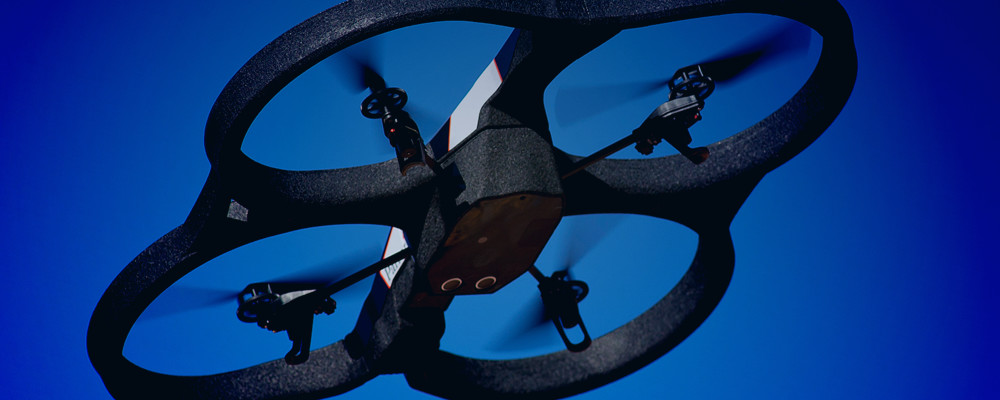Unmanned Systems Pathway
The Unmanned Systems Pathway is designed for dual enrollment students interested in pursuing a degree program or career in the emerging unmanned systems industry.
This pathway focuses on the growth, innovative development, and effective use of unmanned system technology across the respective domains (air, space, ground, and maritime).

There are two options available:
An introductory course in aeronautical sciences that provides students an orientation in aviation topics appropriate to Aeronautical Science degree programs. Subjects include the aviation profession, the science of flight, safety, security and human factors; aviation resources; the aviation environment; and meteorology.
Pre-Reqs: None
Credits: 3
This course is a survey of Unmanned Aerial Vehicles (UAV) and systems, emphasizing the military and commercial history, growth and applications of UAVs. Course will include basic acquisition, use and operation of UAVs with an emphasis on operations.
Pre-Reqs: None
Credits: 3
This course provides students with a foundation in physics as required to understand unmanned systems applications such as sensor technology; communication and control interfaces; and electro-technical and electronic application design, construction, & implementation. Emphasis is put on elementary particle theory, field properties, wave propagation, and optical relationships as required for an understanding of applications within the electromagnetic spectrum to include modulation concepts, analog and digital electronic circuitry to include signal logic, and electromechanical and electromotive devices to include servo applications.
Pre-Reqs: PHYS 102 and MATH 140 and MATH 142 or MATH 143 or MATH 111
Credits: 3
This course will introduce undergraduate students to specific aspects of small unmanned aircraft systems (sUAS) flight and mission planning in support of task-oriented flying operations. Attention will be given to tools, methods, and skills used to support selection, configuration, and application processes during planning, pre-flight, inflight (monitoring and data-gathering), post-flight, and post-processing procedures. A comprehensive understanding of current sUAS systems and operating requirements will be reviewed and navigation concepts and components introduced. Unmanned aircraft contain a variety of system packages that are unique to the environment in which they operate. The student will identify the system packages available, and determine their proper operation during unmanned aircraft flight applications.
Pre-Reqs: ASCI 260
Co-Reqs: UNSY 235L
Credits: 3
This laboratory is dedicated to Unmanned Aircraft System (UAS) flight planning techniques, procedures, and methods. Students will apply vehicle specific knowledge to create detailed flight plans and adhere to procedures. This lab is designed to complement UNSY 235
Pre-Reqs: ASCI 260
Co-Reqs: UNSY 235
Credits: 1
This course is a study of basic descriptive and inferential statistics. Topics include types of data, sampling techniques, measures of central tendency and dispersion, elementary probability, discrete and continuous probability distributions, sampling distributions, hypothesis testing, confidence intervals, and simple linear regression.
Pre-Reqs: MATH 111 or MATH 140 or MATH 143 or MATH 241
Credits: 3
This course includes high-level exposure to the foundation of collegiate-level coursework, history, careers, disciplines, and operations of the world’s aerospace industry. An introductory focus will be placed on aerospace physics (secondary education core curriculum components), engineering, management, operations, and maintenance.
Additional skills, such as academic strategies for success and exposure to distance learning modalities, will prepare secondary students for future collegiate studies. Upon completion of the single Carnegie Unit course (one academic year), students will be prepared for college-level course work in focused disciplines, and will also have an understanding of academic and career paths in aviation and aerospace.
Pre-Reqs: None
Credits: 0
This course develops the aeronautical knowledge required for certification as a Private Pilot with an Airplane Single Engine Land rating. Topics include; regulations, safety, pre-solo operations, cross-country planning, airspace, chart use, communications, weather, performance, weight and balance, aerodynamics and decision-making.
Pre-Req: None
Co-Req: ASCI 121L
Credits: 5
This course supports the aeronautical knowledge testing preparation required as part of the certification for the appropriate FAA certification or ratings. Students are introduced to airman’s knowledge testing (AKT) employed by the FAA and are also exposed to the electronic testing software and testing procedures.
Pre-Reqs: None
Co-Reqs: ASCI 121
Credits: 1
An introductory course in aeronautical sciences that provides students an orientation in aviation topics appropriate to Aeronautical Science degree programs. Subjects include the aviation profession, the science of flight, safety, security and human factors; aviation resources; the aviation environment; and meteorology.
Pre-Reqs: None
Credits: 3
This course is a survey of Unmanned Aerial Vehicles (UAV) and systems, emphasizing the military and commercial history, growth and applications of UAVs. Course will include basic acquisition, use and operation of UAVs with an emphasis on operations.
Pre-Reqs: None
Credits: 3
This course will introduce undergraduate students to specific aspects of small unmanned aircraft systems (sUAS) flight and mission planning in support of task-oriented flying operations. Attention will be given to tools, methods, and skills used to support selection, configuration, and application processes during planning, pre-flight, inflight (monitoring and data-gathering), post-flight, and post-processing procedures. A comprehensive understanding of current sUAS systems and operating requirements will be reviewed and navigation concepts and components introduced. Unmanned aircraft contain a variety of system packages that are unique to the environment in which they operate. The student will identify the system packages available, and determine their proper operation during unmanned aircraft flight applications.
Pre-Reqs: ASCI 260
Co-Reqs: UNSY 235L
Credits: 3
This laboratory is dedicated to Unmanned Aircraft System (UAS) flight planning techniques, procedures, and methods. Students will apply vehicle specific knowledge to create detailed flight plans and adhere to procedures. This lab is designed to complement UNSY 235
Pre-Reqs: ASCI 260
Co-Reqs: UNSY 235
Credits: 1
